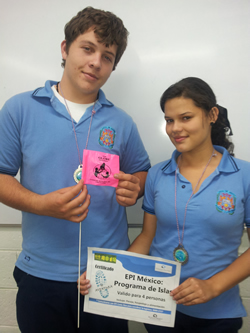Stars and STEM Stories
GLOBE Students from Costa Rica Win First Prize in Biociencia 2012 Fair

Many public high schools in Costa Rica utilize their campus science club as a platform for the development of GLOBE hydrology investigations that encourage scientific thinking through inquiry-based research methods including data collection and analysis. Students use these data to explore environmental problems within their local communities.
GLOBE students in Costa Rica are encouraged to present their research results in both national and international events. Students took advantage of one such opportunity recently at the Biociencia 2012 Fair held at INBioparque on 22 September 2012. The event, which hosted 330 students from 10 public and private high schools, was the perfect setting for the presentation of 21 science projects in a scientific poster competition. Hosted by Ecology Project International (EPI), the fair was supported by the Ministry of Public Education (MEP), the Ministry of Science and Technology (MICIT), the Ministry of Environment, Energy and Telecommunications (MINAET), the United Nations Development Program (PNUD), Intel and Banco Popular.
Students structured their presentations around the scientific method, in which a preliminary research question allows the use of scientific research to increase awareness about environmental issues. Through their work, students hope to inspire new questions and investigations that other GLOBE students can use to acquire more knowledge about their own study sites and Earth's environment as a whole.
GLOBE students Arturo and Rosa from Liceo de Tarrazú won first place in the scientific poster competition with their project: "Macroinvertebrates and Their Relationship with Water Quality in the El Sitio Micro-Watershed." Of the many research questions proposed by GLOBE students, one that has particularly peaked their interest is the makeup of freshwater macroinvertebrate communities and the use of this information to evaluate water quality at their hydrology study sites.
Second place was awarded to Lorenzo, Jéssica and Jennifer of Liceo Innovación Educativa de Pocora for their project: "Incubation, Embryo Development and Predators of Eggs of the Baula Turtle (Dermochelys coriacea) in Pacuare Reserve, Limon, Costa Rica."
Third place winners were Gina, Stephanie and Vera of María Auxiliadora School with the theme: "How Will Global Warming Affect the Reptiles?" with a focus on "Dermochelys coriacea," more commonly known as the leatherback sea turtle.
Student-centered initiatives are encouraged by GLOBE Country Coordinator Mr. Roberto Quirós, who favors the promotion of research that links science with local issues. According to Quirós, "GLOBE students and educators in Costa Rica hope that their local research will contribute to awareness of environmental problems on a more global scale."
This work is made possible thanks to the support of the National Program of Educational Informatics MEP-FOD (collaboration between the Ministry of Public Education and the Omar Dengo Foundation). The GLOBE team in Costa Rica also works closely with important research institutions such as The University of Costa Rica, Aquabiolab and STROUD Water Research Center on issues regarding biomonitoring with aquatic macroinvertebrates. These relationships help to inspire the next generations of Costa Rican entomologists, environmentalists and scientists.
Read about a recent collaboration between Costa Rica and West Florida.
Read more GLOBE Stars from Costa Rica:
Costa Rica Celebrates the First Scientific Environmentalism Festival
GLOBE Costa Rica Documents Hydrology Training With Film
Water, Hub of GLOBE Activities in Costa Rica
1 November 2012





